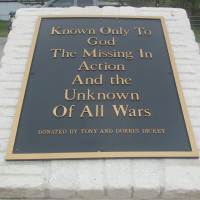Can Pentagon Fix Shameful Track Record of Finding and Identifying Remains of Missing U.S. Soldiers in Foreign Lands?
Saturday, February 07, 2015
 |
| Plaque at Veterans Memorial Park in Rhome, Texas (photo: Wikipedia) |
Outgoing Defense Secretary Chuck Hagel promised to implement reforms to erase the backlog of “unknowns,” buried around the world, believed to be about 9,400 according to ProPublica. Some of the missing fought in Vietnam, others during the Korean War, and still others in World War II.
One unknown was Private Arthur “Bud” Kelder, who died in the Philippines 73 years ago. Kelder was buried with several other prisoners in 1942 near the Japanese prison camp in which he died. Although Kelder’s family members provided strong evidence of the location of his remains, the Joint Prisoners of War/Missing in Action Accounting Command (J-PAC) and its longtime scientific director, Tom Holland, refused to investigate the grave and have Kelder’s remains shipped home. Only after the Kelder family’s story was published did the Pentagon officially identify his remains last month. Holland was fired late last year.
J-PAC also declined to work to return home the remains of another soldier, this one from Europe. Private First Class Lawrence Gordon was killed in Normandy in 1944 and was mistakenly identified as a German soldier and buried in a German cemetery. It fell to the Germans, our former enemies, and the French to send Gordon’s remains home.
A key to identifying remains buried overseas is DNA—that of the soldiers and any relatives still alive. But with many from the World War II era in their 80s and 90s, fewer relatives are available for officials to contact and collect genetic material from.
Holland’s office was reluctant to use DNA to identify soldiers’ remains for fear of making an error, saying they must first narrow down who the person might be. “It doesn’t matter that I’ve identified 500 people correctly. If I misidentify one, that’s what going to be the focus. That’s what’s going to be on the news. That is what is going to erode the credibility. That’s what I go home with every night,” Holland told ProPublica last year.
Hagel hopes to address these problems through “sweeping reforms to address the current inefficiency” and the establishment of a new office to oversee the POW/MIA identification. In addition, “a medical examiner will lead identification efforts that will rely heavily on the latest in DNA testing and a new database will list all of the missing. The new agency will also seek assistance from other organizations and outside groups,” according to Sara Afzal at ProPublica.
The changes should improve a process that currently identifies an average of only 72 people a year, even though the Pentagon spends $100 million annually on this effort.
-Noel Brinkerhoff, Steve Straehley
To Learn More:
The Pentagon’s Failure to Find Long Lost Soldiers (by Sara Afzal, ProPublica)
Pentagon Overhauls Effort to Identify its Missing (by Megan McCloskey, ProPublica)
French, Germans Return Fallen GI After Pentagon Fails To Act (by Megan McCloskey, ProPublica)
The Military Is Leaving the Missing Behind (by Megan McCloskey, ProPublica)
North Korea Wants America to Take Home the Bodies of 5,000 Soldiers (Associated Press)
Defense POW/MIA Accounting Agency (U.S. Department of Defense)
Air Force Dumped Ashes of 274 Troops in Landfill (by Noel Brinkerhoff, AllGov)
Gruesome Details of Mishandled War Dead at Dover Air Force Base (by Noel Brinkerhoff, AllGov)